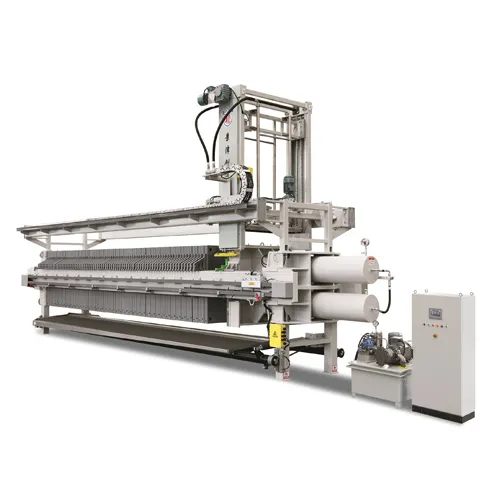What is a filter press used for?
Ago 15, 2024
In the vast landscape of industrial machinery, the filter press stands as a cornerstone in solid-liquid separation processes. With China being a global hub for manufacturing excellence, several prominent China Filter Press manufacturers and Filter Press factories are leading the way in innovation and production.
Jingjin is the prominent Filter Press factory in China, specializing in the manufacture of high-quality and advanced filter presses for various industrial applications, is at the forefront of driving innovation and excellence in the industry.
How It Works
The filter press operates by applying pressure to a slurry, which is a mixture of solids suspended in a liquid. The slurry is pushed through a sequence of filter plates covered in filter cloths once it is pumped into the press. The solid substance remains behind as a filter cake when the liquid passes through the cloths under increasing pressure. The solids are retained inside the press and eventually form a dense, dehydrated cake, while the filtrate, or separated liquid, comes out of the press.

Applications Across Industries
Mining and Minerals: In the mining sector, filter presses are employed to separate valuable minerals from waste slurry. This not only enhances the recovery of valuable materials but also minimizes waste and its environmental impact.
Wastewater Treatment: Filter presses are essential in wastewater treatment plants, where they help in dewatering sludge, reducing the volume of waste, and making disposal easier and more cost-effective.
Chemical Manufacturing: In the chemical industry, filter presses are used to purify products, recover valuable chemicals, and treat effluents, ensuring compliance with environmental regulations.
Food and Beverage: The food and beverage industry relies on filter presses for tasks such as juice clarification, wine filtration, and the processing of edible oils, ensuring high-quality end products.
Advantages
The filter press offers several advantages, including efficient moisture removal, high solid content recovery, and relatively low operational costs. Its design allows for easy scalability, making it suitable for both small and large-scale operations. Additionally, the equipment is known for its durability and reliability, providing consistent performance over long periods.
Efficient Moisture Removal
The ability of a filter press to effectively remove moisture from slurry mixtures is one of its main benefits. The filter press removes the liquid from the slurry by using high pressure, leaving behind a much drier solid cake. This high degree of moisture removal is essential for lowering the weight and volume of waste, which in turn lowers the cost of disposal and facilitates easier and more economical handling and transportation. This capability is especially helpful for sectors where effectively controlling trash is essential, such as mining and wastewater treatment.
High Solid Content Recovery
The purpose of filter presses is to extract as much solid material as possible from a liquid mixture while preventing the loss of important components. In sectors like mining, where obtaining the maximum amount of the valuable mineral content is directly related to profitability, a high recovery rate is critical. The capacity to maintain a high proportion of solid material guarantees the end product’s purity and quality in the food and chemical processing industries, fulfilling strict industry requirements and customer expectations.
Relatively Low Operational Costs
Another significant benefit of the filter press is its relatively low operational costs. Once the initial investment is made, the ongoing expenses are minimal, primarily involving maintenance and the replacement of filter cloths. The energy consumption of a filter press is also relatively low compared to other types of filtration equipment, making it an energy-efficient choice. This cost-effectiveness is a crucial consideration for businesses looking to optimize their production processes without incurring excessive overheads.
Scalability for Various Operations
The design of the filter press allows for easy scalability, making it suitable for both small-scale operations and large industrial applications. This flexibility means that businesses can start with a filter press size that meets their current needs and can easily scale up as their production requirements grow. For large-scale operations, multiple filter presses can be operated in parallel to handle higher volumes of slurry, ensuring consistent production flow without bottlenecks.
As industries continue to seek efficient and sustainable solutions for their production processes, the filter press remains a cornerstone technology. Its ability to effectively separate solids from liquids not only enhances productivity but also contributes to environmental sustainability by reducing waste and promoting the recycling of valuable resources.
For more information on filter press technology and its applications, please contact us.
